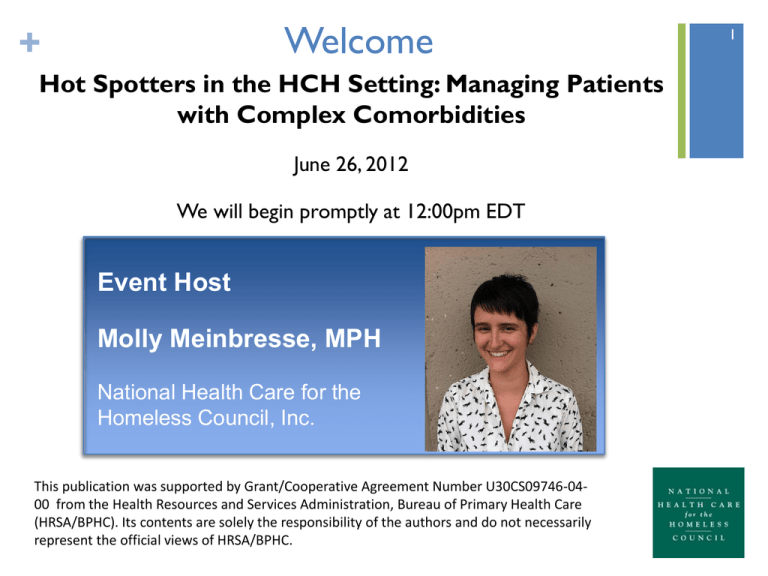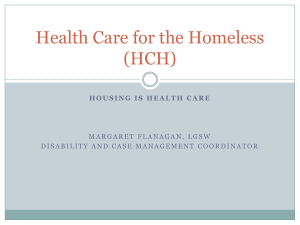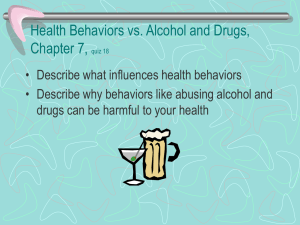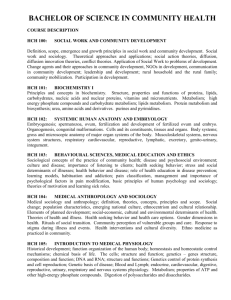Hot Spotters Webinar Slides
advertisement

Welcome + Hot Spotters in the HCH Setting: Managing Patients with Complex Comorbidities June 26, 2012 We will begin promptly at 12:00pm EDT Event Host Molly Meinbresse, MPH National Health Care for the Homeless Council, Inc. This publication was supported by Grant/Cooperative Agreement Number U30CS09746-0400 from the Health Resources and Services Administration, Bureau of Primary Health Care (HRSA/BPHC). Its contents are solely the responsibility of the authors and do not necessarily represent the official views of HRSA/BPHC. 1 + Hot Spotters in the HCH Setting: Managing Patients with Complex Comorbidities June 26, 2012 Health Care and Housing are Human Rights + Presenters Judith Mealey, MS, ANP, RN, Program Manager, Nurse Practitioner Health Care for the Homeless Mercy Medical Center 3 Bill Friskics-Warren, Mdiv Director of Services for Homeless People, United Neighborhood Health Services Crystal Carey, Clinical Director, United Neighborhood Health Services + 4 Overview Background of Complex Comorbidities Project Review of the Literature Results of HCH field interviews Project Highlight - Mercy Medical HCH Project Highlight – United Neighborhood Health Services Hot Spotter Program Encouraging Routine Care Q &A + Approach Clinicians expressed challenge in providing care to patients with complex comorbidities Limited clinical guidance available Desire to explore promising practices Conducted HCH field interviews to learn what others are doing + Review of Literature – General Population Measuring multiple chronic conditions (MCC) Simple count vs count + severity Top 5 Comorbidities in Veterans (Lee, 2007) Highest 5-year Mortality Rates 1. Diabetes + hypertension (n=47,568) 2. Ischemic heart disease + hypertension (n=28,154) 3. Depression + osteoarthritis (n=23,692) 4. COPD + hypertension (n=11,883) 5. COPD + ischemic heart disease (n=7,235) 1. Cancer + COPD (40%) 2. Cancer + diabetes (25%) 3. Cancer + ischemic heart disease (23%) 4. Diabetes + COPD (17%) 5. Cancer + hypertension (15%) + 7 Review of Literature (continued) MCC in general population Extremely prevalent Care is expensive Associated with negative health outcomes Care coordination difficult Medication management complicated + 8 Review of Literature - Homelessness Prevalence (Goldstein, 2008) Gaps in Literature Drug abuse + alcohol abuse (78%) Prevalence data Tuberculosis + alcohol abuse (73%) Mortality rates Hepatic + alcohol abuse (71%) Heart/cardiovascular + hypertension (70%) Focused mostly on dual diagnoses Tuberculosis + drug abuse (68%) Gastrointestinal + alcohol abuse (66%) Gastrointestinal + orthopedic (65%) Hepatic + drug abuse, orthopedic + alcohol abuse, alcohol abuse + drug abuse (63%) Management recommendations Integrated care Community partnerships Effective clinician communication + 9 Review of Literature - Homelessness Strategies for Dual Diagnoses (Foster, 2009) Stabilize patients – provide housing, basic needs, support for “daily living activities” Thorough medical history before engaging in interventions Increase access to services – medical, mental health and substance abuse Utilize motivational approaches to encourage participation in care Trauma-informed care Provide opportunities for peer support and group treatment Integrated mental health and substance abuse services Interdisciplinary teams and regular treatment planning meetings, crosstraining, multiple service locations, and partnerships with other community agencies + 10 Review of Literature - Homelessness Challenges (Foster, 2009) Client behavior problematic and hindrance to success of program Providers need more time to build relationships with clients. Projects experienced staff and community resource limitations Local communities not necessarily supportive of integrating mental health and substance abuse into treatment + 11 Literature Review - Federal Recommendations Multiple Chronic Conditions: A Strategic Framework (U.S. Department of Health and Human Services, 2010) Foster health care and public health system changes to improve the health of individuals with MCC Maximize the use of proven self-care management and other services by individuals with MCC Provide better tools and information to health care, public health, and social service workers who deliver care to individuals with MCC Facilitate research to fill knowledge gaps about, and interventions and systems to benefit, individuals with MCC + 12 Field Interviews – HCH Projects Mercy Medical Center HCH program (Springfield, MA) Peak Vista Community Health Centers HCH project (Colorado Springs, CO) Outside In (Portland, OR) Franklin Primary Care H.E. Savage Memorial Center HCH project (Mobile, AL) + 13 Field Interview Results Staffing & services Short-staffed, social services and SA/MH staff in particular Lack of specialty care, advanced labs and diagnostics Presence of chronic disease management programs and health education, but none specific to comorbidities Difficulty in referring patients to specialists and coordinating care Identifying & tracking Informal tracking of complex comorbidities, inconsistent across sites Case conferences with integrated care teams utilized + 14 Field Interview Results Top cluster of complex comorbidities reported for each site: Mercy Medical Mental health, substance abuse, tobacco abuse Peak Vista Chronic pain, mental health, tobacco Outside In COPD, mental health, chronic liver disease, substance abuse, tobacco use, dental issues H.E. Savage of Franklin Primary Diabetes, mental health, cardiovascular disease + 15 Field Interview Results Models of care Patient-Centered Medical Home model, or the Primary Care Home Model Chronic Care Model Guidelines Specific chronic disease guidelines (e.g. asthma, hypertension) Evidence based practices Motivational interviewing Harm reduction Comprehensive care management Trauma-informed care Care coordination Case conferences EMR “ticklers” + 16 Recommendations Share HCH models for increasing capacity to identify and treat patients with complex comorbidities Evaluating outcomes Develop method for measuring complex comorbidities, or MCC Test tracking system Provide assistance to better utilize EMR for tracking and following up on care + Identifying & Managing Hot Spotters in the HCH Setting Judy Mealey Mercy Medical HCH Springfield, MA 17 + + + + Hot Spotters in Health Care for the Homeless Program – We Do That! High medical cost does not equal good health outcomes Complex social needs have a negative impact on health outcomes + HCH Programs Well-Suited to Address Complex Comorbidities Gift of time Team approach Flexibility True patient-centered care Belief that everyone deserves quality care We never give up on people We do what needs to be done + Key to Success Weekly team meetings + Identifying Hot Spotters Who are our hot spotters? + + + Tools Patient engagement Motivational Patient interviewing centered goals + + + Resources National HCH Council Publication (June 2007) Self-Management Support: Helping Clients Set Goals to Improve Their Health by Sharon Morrison + Measuring Success Engagement HRSA measures/Chronic disease guidelines Patient identifies improved quality of life Meeting patient goal + + Strengths EMR Imbedded Strong Team mental health outreach component approach and respect of all disciplines + Weaknesses & Barriers EMR Community Chronicity barriers of chronic disease + Case Study - Richard 49 Yr. Old Homeless Man Discharged from MH unit after suicide attempt Medical issues Chronic alcoholism Depression with multiple suicide attempts Avascular necrosis – both hips Chronic pain Neurogenic/hypotonic bladder Diabetes Tobacco use + Case Study - Richard Social No Problems social support Shelter tenuous Poor social skills Functionally illiterate + The 10-Month Journey Successes Work in progress Engaged High Bilateral hip replacement Sober 5 months (one time relapse) Stable meds on mental health No relapse risk permanent housing + + Encouraging Routine Care United Neighborhood Health Services Nashville, TN Creating The a welcoming environment role of self-management + 40 National HCH Council Resources Adapted Clinical Guidelines Healing Hands Articles General Recommendations for the Care of Homeless Patients (2010) Chronic Pain Adaptive Guidelines (2011) Caring for Clients with Comorbid Psychiatric & Medical Illnesses (2009) Meeting the Challenges of Comorbid Mental Illness & Substance-Related Disorders (2009) Integrating Primary & Behavioral Health Care for Homeless People (2006) Monographs Key Elements of Integrated Care for Persons Experiencing Homelessness (2011) Health Care Delivery Strategies: Addressing Key Preventive Health Measures in the HCH Setting (2011) Documenting Disability for Persons with Substance Use Disorders & Cooccurring Impairments: A Guide for Clinicians (2007) Self-Management Support: Helping Clients Set Goals to Improve Their Health (2007) + What do you need? What resources do you need in your practice to help you provide care to patients with complex comorbidities? What resources could you share that your project uses to provide care to patients with complex comorbidities? Health Care & Housing Are Human Rights + Questions & Answers 42 Thank you for your participation. Upon exiting you will be prompted to complete a short online survey. Please take a minute to complete the +survey to evaluate this webinar production. 43








